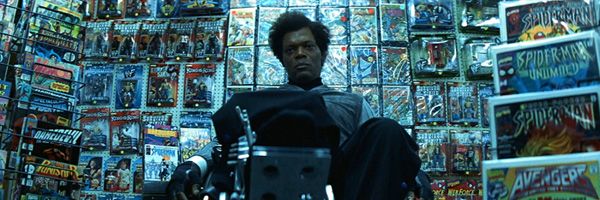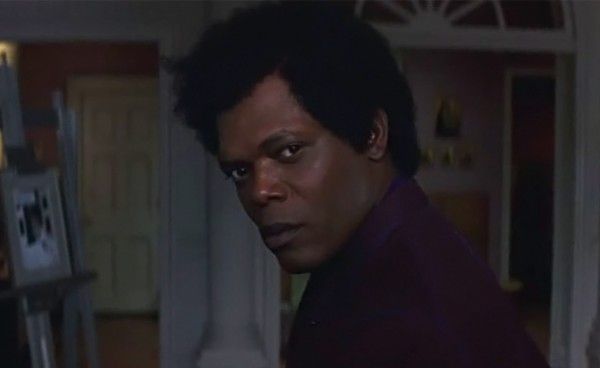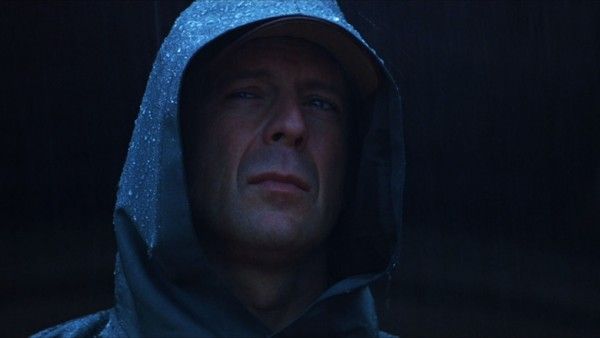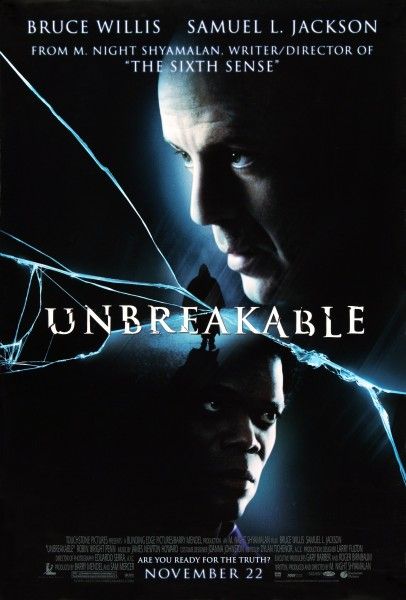Spoilers ahead for Unbreakable.
In 1999, M. Night Shyamalan was on top of the world. His third feature, The Sixth Sense, had been a massive, worldwide success. The film was nominated for Best Picture and it earned Shyamalan nominations for Best Director and Best Original Screenplay. He basically had carte blanche for his follow-up feature, and he chose to make Unbreakable, a movie about superheroes and comic books. Despite carrying a budget of $75 million—$35 million more than The Sixth Sense—the film only made $95 million at the box office when it opened over Thanksgiving in 2000. Looking back at the film now, it’s clear that what felled the film was that the audience wasn’t savvy enough to see what Shyamalan was doing.
I was as guilty of this as anyone. For me, I got hung up on the twist ending. For those who haven’t seen the film or just need a refresher, the plot follows David Dunn (Bruce Willis), a security guard who’s the lone survivor of a massive train derailment. This brings him into contact with art gallery owner Elijah Price aka “Mr. Glass” (Samuel L. Jackson), so named as a child by the taunts of the other children because his fragile bones “break like glass.” Price tells David that he believes superheroes and comic books are simply a new form of pictorial storytelling. The comics may function as “exaggeration”, but they hold core truths, and a man like Dunn, who can survive a train wreck, has never gotten sick, and has only one weakness (water), fits the profile of a superhero. Slowly, Dunn comes to realize that Price is right and that he must use his “powers” to help people.
The “twist” of the film is that the train wreck, as well as two prior catastrophes that happen before the movie begins, were the work of Price looking for someone like Dunn. When I saw the film back in 2000, I had a big problem with the twist because it felt like Shyamalan had cheated the audience. Unlike The Sixth Sense, where everything was right in front of us, the information that Price had caused these accidents was new and the scenes showing him planning or causing the accidents had never been seen before. I felt like it was a twist for the sake of a twist, but I misread what the real twist of the movie is: Price is the villain not because of his actions, but because of the tropes of the story
When you go back and rewatch Unbreakable, it’s clear that, like with The Sixth Sense, Shyamalan has laid out all the information in front of you. But the information Shyamalan provides isn’t about the train crash or the other accidents. He’s laying out superhero tropes, specifically with regards to heroes and villains. For example, at one point Price mentions the square jaw of and symmetrical features of the hero contrasted against the asymmetry of the villain, and we can’t help but notice Price’s asymmetrical hairstyle and later how one of his legs is broken. Additionally, the film is genius with colors, usually putting David in green while Price and even Price’s mother, tend to wear purple. If you’re on the film’s frequency, these details are unmistakable, but they’re also easy to miss if you don’t understand what Shyamalan is doing.
It was incredibly easy to miss all of this because in 2000, superheroes and comics were still niche. By the time Unbreakable arrived in November 2000, there had basically been Batman, Superman, and X-Men. Batman was on hiatus because Batman & Robin had been so awful back in 1998. There hadn’t been a Superman movie since 1987’s Superman IV: The Quest for Peace. And X-Men was trying to forge a new direction for adaptations of comic book superheroes. So Unbreakable enters a marketplace where superhero movies haven’t really come in vogue, and he’s trying to explain to an audience why they should take comic books seriously.
In retrospect, audiences just weren’t ready for Unbreakable. It’s tough to deconstruct a narrative when the audience doesn’t even fully understand the construction. Unbreakable does its best to at least try and make a case for why comic books need to be appraised as serious artwork. The film stops just so Price can explain a comic book cover’s artistry and later he argues that comics are just the latest form of pictograms. If we study hieroglyphics seriously, why not comics? Why are comics for kids when their artistry is as worthy of dissection and analysis as any other storytelling medium?
Today, that makes a lot of sense to a mainstream audience that will happily see multiple movies a year based on comic books. Less than twenty years after the release of Unbreakable, six of the top ten highest grossing films of the year were about superheroes and five of those six were based on comic books of some kind (the outlier being Incredibles 2). In the last 18 years, audiences have been acclimated to the tropes of superhero stories and how they operate so that even if they don’t read the comics, they still understand the narratives.
Of course, Shyamalan had no way of knowing that there would be a boom in superhero movies in the years following the release of Unbreakable, but the film is far easier to understand now than it was in 2000. Instead of being made to look silly by age, Unbreakable was far out ahead of where it needed to be. People who only knew Shyamalan by The Sixth Sense only saw the twist and missed the bigger picture.
That being said, there were those who understood right away what Shyamalan was doing and instantly appreciated Unbreakable. These were the people who have been keeping the flame alive, and they were unexpectedly rewarded in 2016 when Split turned out to be a standalone sequel to Unbreakable. Now, over 18 years since the release of Unbreakable, those fans will finally get the direct sequel they’ve been waiting for with Glass, a superhero film that enters a very different landscape than the one we saw in 2000. Maybe this time, the world will finally be ready for what Shyamalan has in store.
Glass opens January 18th. Click here to see if you’re a hero or a villain.




